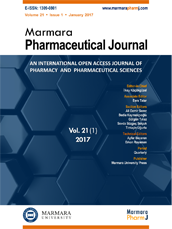2Oncology Center, Dr. Lütfi Kırdar Kartal Teaching and Research Hospital, Istanbul, Turkey DOI : 10.12991/marupj.323286 Drug related-problems pose additional worse outcomes in cancer patients treated with chemotherapy. A vital role of the clinical pharmacist is the detection and prevention of drugrelated problems. The provision of patient education is an important step to reduce and prevent drug-related problems during chemotherapy administration. The objective of this study was to assess the occurrence of drug-related problems and the importance of effective provision of patient education and appropriate recommendations by the clinical pharmacist in reducing and solving of these problems in diabetic patients suffering from cancer.
A prospective study carried out on 50 diabetic patients as a single group with new diagnosis of diverse cancer types eligible for chemotherapy adminitration recruited between September 2014 and April 2015 at the oncology unit in one of the Teaching and Research Hospital (Istanbul-Turkey). Drug-related problems were evaluated, and proper patient education alongside pharmacist recommendation regarding chemotherapy was provided during the required chemotherapy protocol schedule. (n=65) of the drug-related problems were contributed to inappropriate IV fluid selection; (n=33) were attributed to low drug dose prescribed, and (n=30) to high drug dose prescribed. Drug-related problems totally solved due to clinical pharmacist recommendations were 69.57% (n=80). There was a significant increase in the occurrence of paleness (P=0.0001); urinary frequency (P=0.003); loss of appetite (P=0.0001), nausea (P=0.0001), vomiting (P=0.0001); and numbness (P=0.0001). A significant decrease in the occurrence and severity of chemotherapy-related adverse effects was observed as a mild urinary frequency (P=0.0001) and mild vomiting (P=0.0001) after the clinical pharmacist recommendations and provision of patient education.
Results of this study revealed that diabetic cancer patients are definitly prone to the occurrence of drug-related problems and adverse drug reactions. Clinical pharmacist is expected to provide a well-defined education and care to those patients and the outcomes of pharmacist recommendations may diminish and prevent many drug-related problems and adverse drug reactions and by this, influence patients" desire to complete the course of chemotherapy.
Keywords : Clinical Pharmacist Recommendations, Diabetes Mellitus, Drug-Related Problems, Adverse Drug Effects
